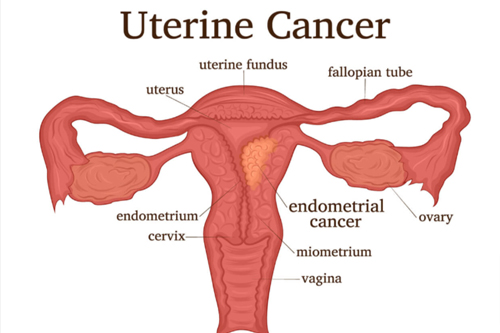Uterine Cancer In Nagpur

Uterine cancer, also known as endometrial cancer, is a type of cancer that begins in the lining of the uterus, called the endometrium. The uterus is a pear-shaped organ located in the pelvis, where a baby grows during pregnancy. Uterine cancer is the most common cancer of the female reproductive system.
Uterine cancer is often diagnosed at an early stage, and the prognosis is generally favorable, especially when detected and treated early. As with any cancer, early detection and timely treatment are crucial for improving outcomes. Women experiencing symptoms or at risk for uterine cancer should consult with their healthcare providers for appropriate screenings and discussions about risk factors.
What are the symptoms of uterine cancer?
Abnormal Vaginal Bleeding: Unusual bleeding, such as bleeding between periods, after menopause, or heavier or longer menstrual periods than usual, may be a sign of uterine cancer.
Pelvic Pain or Discomfort: Persistent pelvic pain or discomfort, unrelated to menstruation or other known causes, should be evaluated.
Pain During Intercourse: Pain or discomfort during sexual intercourse can be a symptom, and it should be discussed with a healthcare provider.
Unexplained Weight Loss: Significant and unexplained weight loss that is not attributed to changes in diet or exercise.
Abnormal Vaginal Discharge: Changes in the color, consistency, or odor of vaginal discharge may be a symptom.
Feeling of Fullness or Pressure: Some women with uterine cancer may experience a sensation of pelvic fullness or pressure.
How is uterine cancer diagnosed?
Transvaginal Ultrasound: This imaging test uses sound waves to create detailed images of the uterus and may help identify abnormalities, such as thickening of the endometrium.
Endometrial Biopsy: If abnormalities are detected, an endometrial biopsy may be recommended. During this procedure, a small sample of tissue is collected from the lining of the uterus (endometrium) using a thin tube or suction device. The tissue sample is then examined under a microscope to determine if cancer cells are present.
Dilation and Curettage (D&C):
In some cases, a D&C may be performed to obtain a larger tissue sample for examination. This involves dilating the cervix and scraping a small amount of tissue from the lining of the uterus.
Imaging Studies: Additional imaging studies, such as CT scans, MRI, or PET scans, may be recommended to assess the extent of the cancer and whether it has spread to other organs or lymph nodes.
CA-125 Blood Test: While not a definitive diagnostic test for uterine cancer, elevated levels of the CA-125 protein in the blood may be associated with certain types of uterine cancers. This blood test is often used in conjunction with other diagnostic methods.
Hysteroscopy:
A hysteroscopy involves the insertion of a thin, lighted tube through the cervix to view the inside of the uterus.It may be used to visualize and potentially biopsy abnormal areas.
How is uterine cancer treated?
1. Surgery:
Hysterectomy: Removal of the uterus is a standard surgical procedure for uterine cancer. The extent of the surgery may also involve removing the fallopian tubes, ovaries, and nearby lymph nodes.
Lymph Node Dissection: Removal and examination of lymph nodes in the pelvic and/or para-aortic regions may be performed to determine the extent of cancer spread.
Biopsy: During surgery, additional biopsies may be taken to assess nearby tissues for the presence of cancer.
2. Radiation Therapy:
External Beam Radiation: High-energy rays are directed at the pelvic area to kill cancer cells or shrink tumors.
Brachytherapy: Radioactive materials are placed directly into or near the tumor, providing targeted radiation.
3. Chemotherapy:
- Systemic Treatment: Chemotherapy involves the use of drugs to kill cancer cells or inhibit their growth.
- Administered intravenously or orally, chemotherapy may be used before or after surgery, depending on the stage and type of cancer.
4. Hormone Therapy:
- For certain types of uterine cancers, hormone therapy may be recommended.
- Hormone therapy aims to block hormones that may fuel the growth of certain cancer cells.
5. Targeted Therapy:
- Molecularly Targeted Drugs: Targeted therapies focus on specific molecules involved in cancer growth.
- These drugs may be used in conjunction with other treatments for certain types of uterine cancer.
6. Adjuvant and Neoadjuvant Therapy:
- Adjuvant Therapy: Additional treatment given after primary treatment (surgery) to reduce the risk of cancer recurrence.
- Neoadjuvant Therapy: Treatment given before surgery to shrink tumors and make surgery more effective.
7. Clinical Trials:
- Participation in clinical trials may provide access to new and experimental treatments, contributing to the advancement of uterine cancer research.
8. Palliative Care:
- Palliative care focuses on managing symptoms, improving quality of life, and providing emotional support.
- It is an important aspect of care for advanced-stage or recurrent uterine cancer.
